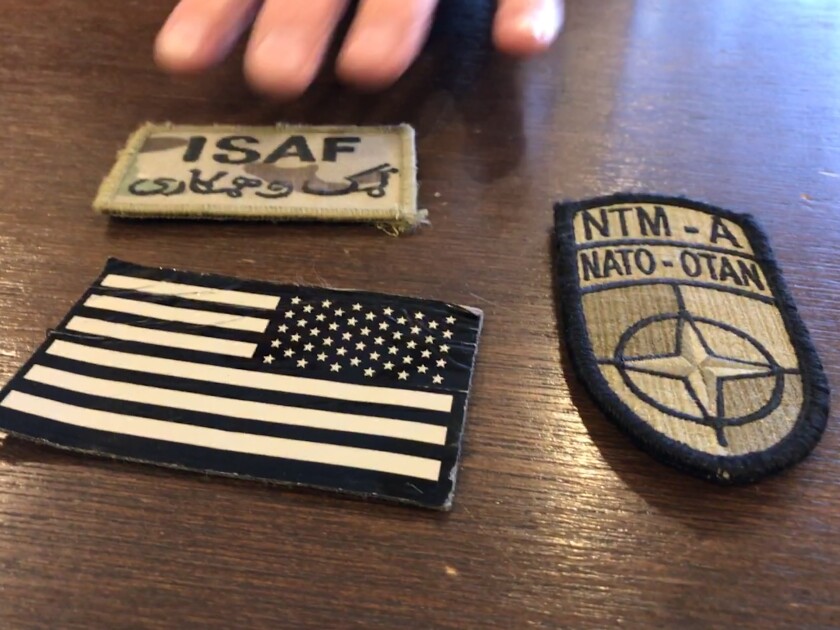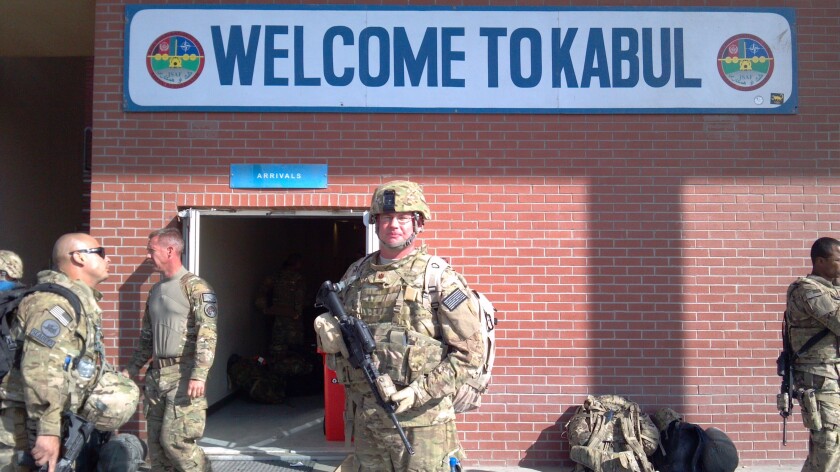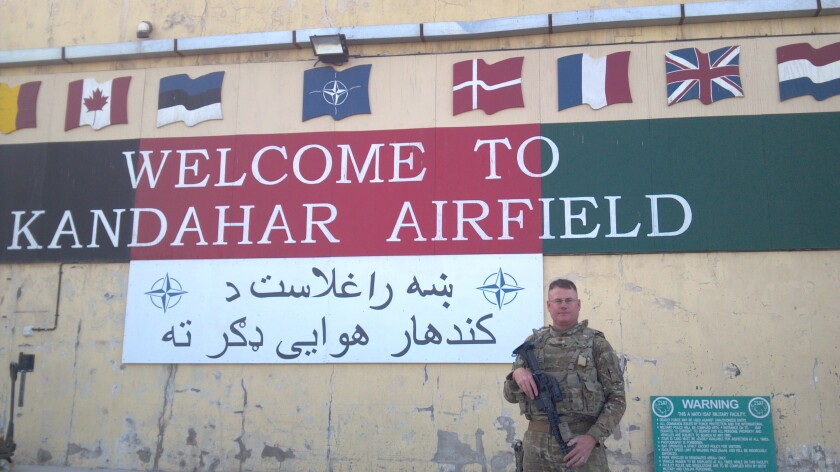As events unfolded last month amid the U.S. troop withdrawal from Afghanistan, Tim Bray couldn’t help but wonder what twists of fate had befallen his Afghan colleagues.
For nearly a year in 2011-12 on a deployment with the Navy Reserve, Bray worked alongside leaders in the Afghan army and police forces to provide training in managing the bases and other infrastructure built by the U.S. military. The goal of the mission, Bray said, was to leave the Afghans able to care for the facilities long after the U.S. military and its partners left — an event that nearly a decade ago felt near.
One Afghan police colonel with whom Bray developed a rapport once confided in the Navy lieutenant commander what he planned to do if this day arrived: move his family to Dubai.
“He had a plan. He knew this wouldn’t last forever. He wanted it to last for a long time, but he had a plan for him and his family,” Bray said during an interview in late August. “… I don’t know where he is, and I think about him. With the recent events … that’s where my mind goes to. Where are they now? Did he execute his plan as of nine years ago? Or was his fate different in the last nine years? So I think about that, and the interpreters, too.”
ADVERTISEMENT

Far removed by time and space from the Herat base in western Afghanistan where he spent much of his deployment, Bray of Crosslake is still reminded of that period of his life in both small and big ways. On a recent trip out West with his wife, the rocky landscape near the Grand Canyon carried whispers of the stark but beautiful terrain Bray witnessed from above while traveling by helicopter. Each time he sees an orange, he thinks of the Afghan police colonel, who showed him a trick to remove the peel in one continuous spiral.
"I don’t know where he is, and I think about him. With the recent events … that’s where my mind goes to. Where are they now?"
— Tim Bray
The colonel and other Afghan leaders taught him more substantive lessons, too, like demonstrating their steadfast perseverance in the face of seemingly insurmountable odds. Bray said he found the overall experience rewarding, pointing to the acquisition of invaluable leadership skills that now serve him as the head of the Crow Wing County Highway Department.
“I was given some very important, difficult projects to do and missions to do,” Bray said. “It really got me a feel for leadership and leaders and leading people and things like that, being in that position. So a very rewarding experience for me.”

ADVERTISEMENT
But Bray is acutely aware the rewards he reaped from serving in Afghanistan do not translate to the experiences of many other service members or their families.
“All deployments change people. But I’ve been fortunate that I was spared some of the conflict and some of the ugly stuff that other people had to go through,” he said. “And so, if I look at some of my fellow soldiers, sailors, Marines and airmen, their experiences weren’t rewarding. It was devastating. And sometimes I feel guilty about that. Almost embarrassed to say that it was rewarding. Because I was never — I didn’t feel like I was in grave danger.”
Originally hailing from the small town of Hazen, North Dakota, Bray began his military career in boot camp just a week after his high school graduation in 1989. He spent the first six years on active duty as an electronics technician aboard ships. He operated and fixed the giant computer system that powered the sonar equipment on the naval vessels, including during Operation Desert Storm when he and the rest of the crew patrolled the Red Sea.
Following this stint, Bray enrolled in North Dakota State University to study civil engineering and joined the Navy Reserve, where he continued working as a technician. After earning his degree, Bray became a commissioned officer in the Civil Engineer Corps — switching from “blue Navy,” or those who serve on the water, to “brown Navy,” or those who serve on the ground. He also found a civilian job with the Minnesota Department of Transportation that landed him in the Brainerd area in 2001.

Bray served his first tour in the Middle East five years later, deployed out of Fort McCoy in a leadership position with the Seabees, the Naval Construction Battalion. Stationed in Anbar Province in Iraq, his unit repaired a bridge, assessed and fixed runways and finished building a surgical center and hospital. In the country during what Bray described as a “hot time” in the war, he lost three members of his Seabees crew in two separate roadside bomb explosions.
“It’s been 15 years, and I think about them all the time. I just say their names all the time,” Bray said. “Jamie, Jerry, Gary.”
ADVERTISEMENT
Experiencing the deaths of soldiers he led brought to fore the idea he himself may not return home to his family, including his infant son, who’d spent weeks in a neonatal intensive care unit upon his premature birth just as Bray was readying to deploy.
This thought, quietly persistent in the background, followed him five years later to Afghanistan. In 2011, the Navy called on Bray for his specialized infrastructure management skills, deploying him as an individual augmentee rather than as part of a unit. He managed a team of soldiers — including some from the Army and Air Force — in detachments spread across three bases.
“When they talk about trillions … of dollars in the paper recently, about how much we spent, I got to see some of that,” Bray said. “We’ve literally built tons of bases and things for that. And that was an effort so they could become independent and then eventually take over control of their government and defend themselves.

“ … You can’t have your troops or your army recruits or your police recruits living in squalor and then still try to be excited about going through this. They need to have a nice place, as nice as it can be: three hots and a cot, right? So a place to have a nice meal, relax, do their thing. We treat our people like that and that’s the key — that was supposed to be the key to success.”
Serving as part of the NATO mission meant Bray mingled with people from all over the world, including those from Italy, Spain, Great Britain, Lithuania and Mongolia. He also worked with Afghan leaders for whom the presence of Americans and their partners was not the first occupation they’d lived through. Evidence of the decade-long Soviet Union occupation from 1979-89 popped up in the form of belt buckles for sale in marketplaces, burned-out vehicles scattered in the desert and the second languages spoken by some. Bray recalled one Afghan on his base did not speak English but did speak Russian, able to be translated through an American who also knew the language.
ADVERTISEMENT
“And if on the foundation, basic safety needs aren’t being met, it’s very difficult to be willing to take the steps to defend your country to the degree in which we are accustomed to doing.”
— Tim Bray
At times, Bray said, his job on base grew frustrating. Those he trained often learned slowly, and that sometimes felt deliberate to him, as if they hoped the Americans would stay longer. Other times, he felt ignored. Logistical challenges abounded as well, including extreme difficulty in hiring local help, problems with receiving supplies and even more problems with keeping those supplies around. But once viewed with a longer lens, Bray said the day-to-day challenges of cross-cultural collaboration made more sense: he was just the latest American in Afghanistan as part of the latest occupation and most recent conflict amid lifetimes’ worth of war.

“This colonel or whoever was there, and they were on that base for 10 years and there I was, the 10th American they had seen to try to kind of do this. … I was there for a short snapshot of time, one year. Over the course of 20 years, that’s nothing,” Bray said. “So there’s some people that I replaced, and I just took over helping, trying to train. And when I left, somebody took my spot to try and keep these bases going.”
Although again Bray felt mostly insulated from combat during his deployment, peril loomed over him and his team at times. In February 2012, riots erupted across Afghanistan after U.S. military personnel at Bagram Base moved to burn about 500 copies of the Quran and other religious texts as part of a security sweep of an Afghan prison. According to a story by The Washington Post, troops believed prisoners were passing notes to one another in the margins of books in the library, and despite warnings from Afghan allies, brought the holy books and others to the incinerator. Although the books were mostly rescued from the flames, anger swept the country and the protests and violence ultimately led to the deaths of 41 people, including four U.S. soldiers.
Bray said this period of unrest became personal for him when members of his team were erroneously targeted as the Americans responsible for the Quran burning. Acting on the false rumor, Afghans in a village near one of the bases stormed the gates. Bray said no violence transpired from the incident, but it was disconcerting to know his colleagues were the only Americans on that base.
ADVERTISEMENT

“It just circulated around that town. Well obviously, it wasn’t the truth, but it didn’t matter. And I imagine that played out all around. There was a huge uprising about that,” Bray said. “After that, there really was a push to wrap up that training.”
The Quran burning was one example of a time when Americans’ alliance with Afghan soldiers and police officers was tested. Bray said he knew of other examples when recruits in boot camps unexpectedly turned on NATO troops, but even more unexpected were times when Afghan officials meeting in office settings with NATO allies drew weapons and, in some cases, managed to wound or kill. One meeting Bray recalled attending happened just one day after someone just like him in a meeting just like that one was shot. Because of these incidents, Bray was trained to carry a gun into meetings and was ready to use it in an instant.
“It isn’t very often you have the safety off, one in the chamber, ready to go. And there’s this Afghan colonel and his people are in the background with their weapons, securing him. It was volatile,” Bray said. “You’re still talking on friendly terms, but everybody is on the ready.”

Nearly a decade after his return in July 2012 and with U.S. involvement now concluded, Bray said there were inklings back then of how difficult it might be at this inflection point. He observed cultural differences that appeared nearly impossible to bridge, particularly when it came to the values driving military service.
“The young men and women that join our military are very patriotic and that’s, you know, from that time you stood on the curb raising American flag during the Fourth of July up through whenever. So the people that join our military, by and large, are willing and understand that you could be called to defend the country and it could mean you die for your country,” Bray said. “ … I don’t know that that is the same cultural norm that their young people have. I mean, think about a country that's been in turmoil and been occupied for now 20 years, and prior to that, the Russians for 10 years. …
ADVERTISEMENT
“And maybe that was part of the challenge, and I think you know the events (since withdrawal). It seemed like in just one week’s time, we’ve been there for 20 years trying to change that culture, that specific part of their culture, I think, and it didn’t work. It appears that they were not ready to defend their country, like we had been training them for for so long.”

It seemed the Afghans were more concerned with the day-to-day safety of themselves and their families without much room left for defending the country in the way Americans perceived they should, Bray said.
“Before you can get up and get comfortable and have niceties in life, you have to have your basic needs met. I would say somewhere on that pyramid is your willingness to go and be ready to defend,” he said. “And if on the foundation, basic safety needs aren’t being met, it’s very difficult to be willing to take the steps to defend your country to the degree in which we are accustomed to doing.”
Bray added he believes the vast majority of Afghans care about and want their nation to survive, and some are still fighting the Taliban takeover. And Bray remains proud of his own service, no matter the conclusion of the U.S.’s nation-building effort.
“I did the best I can. While I was there I didn’t know how it was going to turn out,” he said. “ … I think next time, when we find ourselves in a situation like this again — and over the course of history, we’ve had a couple of these now — I think it might inform the decision of the decision-makers at the time if that’s the way to go.”
CHELSEY PERKINS, community editor, may be reached at 218-855-5874 or chelsey.perkins@brainerddispatch.com . Follow on Twitter at twitter.com/DispatchChelsey .









